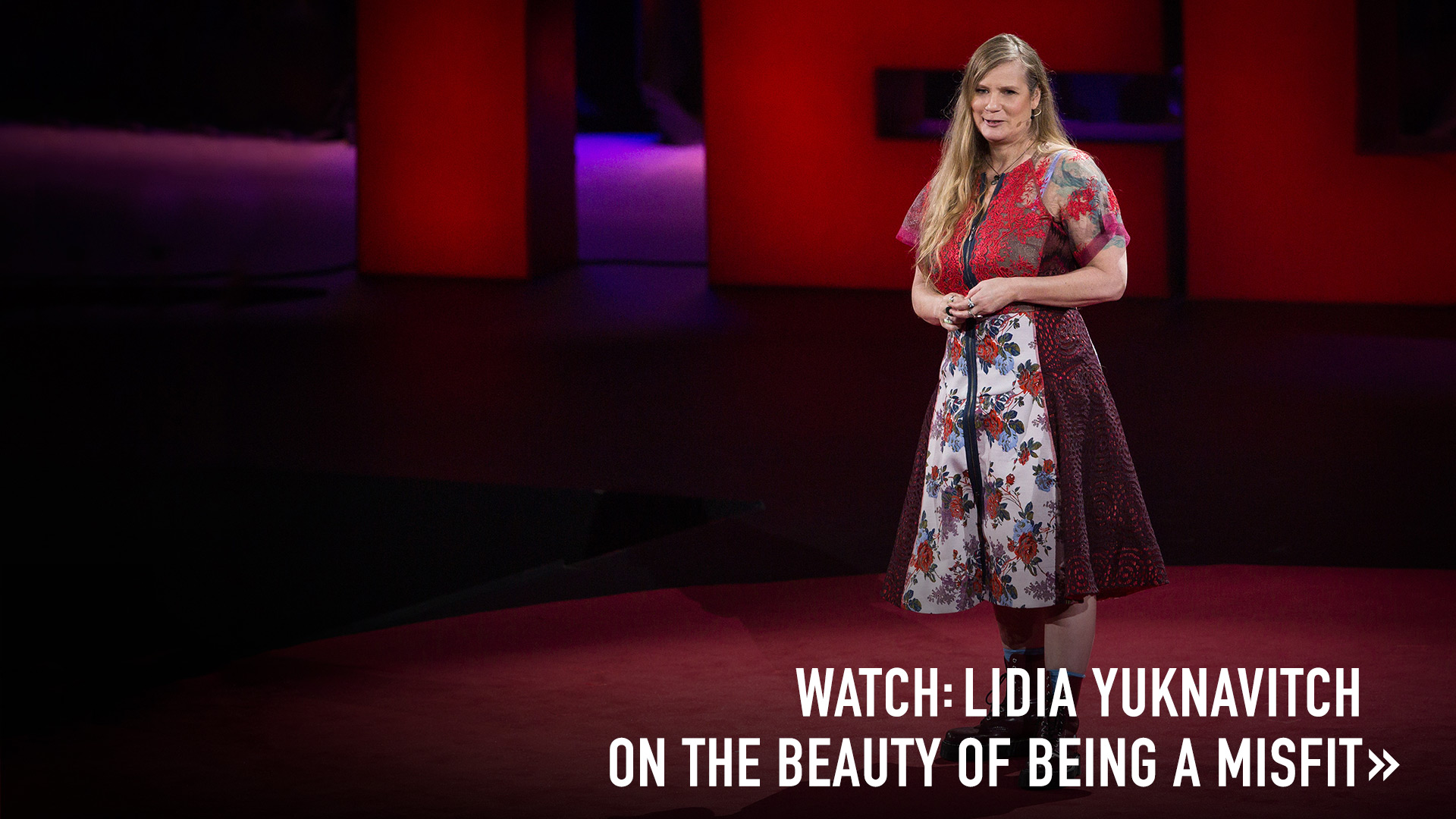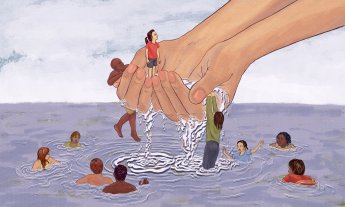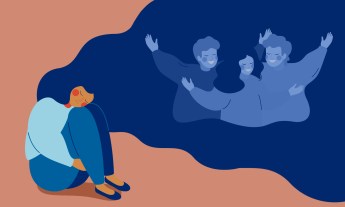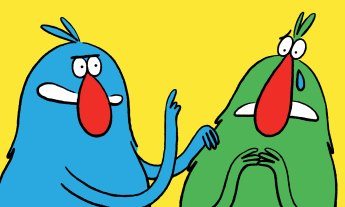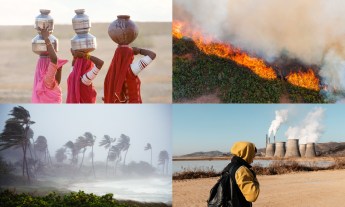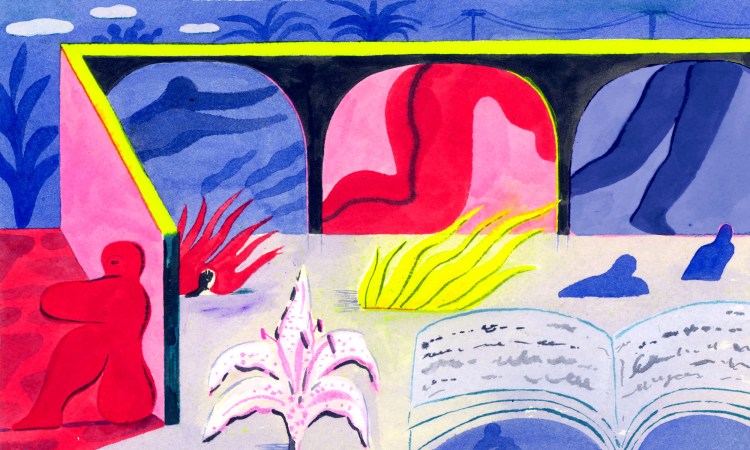
Suffering is not beautiful, nor is it a state of grace. But you can swim to the wreckage at the bottom and bring something back to the surface that can help others, says writer Lidia Yuknavitch.
The truth is, suffering sucks and it can take you to a place of wanting to kill yourself, and there’s nothing beautiful about that. Suffering is not a state of grace. Suffering, from my point of view, is about a real place in a real body where you face the other side of living. How you choose to understand that story probably determines how you’re going to live the rest of your life.
I feel kindred with fellow sufferers, not because they suffer, and not because of some absurd vortex of victimhood camaraderie, and not because sufferers are in a state of grace, but because they go on, they endure. And because sometimes, the sufferer reinvents themself — and this kind of reinvention is what misfits are so good at. Misfits not only know a great deal about alternate and varied definitions of suffering, but misfits are also capable of alchemizing suffering, changing the energy from one form to another.
Here is the thing I want to say loudest of all: I haven’t transcended anything. No great revelation has come my way. I haven’t “moved on.”
So let me tell you a different suffering story that cannot be corralled by a culture that asks you to process your suffering in ways that make you a good citizen in an ever-churning economy of productive people. My daughter died the day she was born. I am not the only person who has experienced the suffering that comes from such a loss. But I am one of those who is willing to stand up, tell the story out loud, admit that I have carried that profound loss, that birth-death crisis, for more than thirty years now.
Here is the thing I want to say loudest of all: I haven’t transcended anything. No great revelation has come my way. I haven’t ascended into some magical wisdom. I haven’t “moved on.” At least not without her — my daughter I mean. And my suffering is not a state of grace. It’s just a part of me. Like my heart. When her birth-death first happened, here is what I did: I lost my marbles. It did not happen instantly.
At the hospital I could feel myself disintegrating a molecule at a time, but I didn’t say anything. I drank the water they gave me, though I didn’t eat the food. I held my swaddled lifeless daughter several times. I kissed her, I cradled her, I sang to her. I let the nurses give me a hot towel “bath” in the bed the second night, which remains on my list of top five most phenomenal physical experiences of my life. I thought I might be dead, but the heated wet towels reminded my skin that I was in fact alive, even if I was deadened.
It was my sister who brought me back to life, slowly, feeding me bits of saltine crackers to lure me back, and then one day an egg, and eventually, a milkshake. The milkshake made me smile.
By the time they released me and sent me home, I wasn’t speaking at all, to anyone. And I wouldn’t let a single human touch me. I felt . . . mammalian. Back to some animal past of pure instinct and wariness of everything around me. The hair on my legs and arms grew long, like white fur, which sometimes happens when someone stops eating.
It was my sister who brought me back to life, slowly, feeding me bits of saltine crackers to lure me back, and then one day an egg, and eventually, a milkshake. The milkshake made me smile. It was my sister who stepped fully clothed into the shower with me when she would hear me sobbing. She held me tight like a mother would, and her clothes, I began to feel the texture of her clothes against my skin.
It took almost a year. Partway through that first year, I did something unethical. I lied. I lied more than you can imagine. I went back to college, and I had a part-time job at a daycare center, which in retrospect may have been a tragic error. I lied to everyone who asked me about my daughter. I told anyone and everyone that she was alive, she was beautiful, such long eyelashes. I lied about where we were living, I lied about the classes I was barely attending. I’d throw my head back and laugh and say, “Motherhood!”
What I’m telling you is that in the face of people who came toward me with their regular-person questions about my pregnancy and birth story, I broke into fictions because I could not make what happened come out of my mouth. My story didn’t fit the other mothers’ stories. Misfit. My lying started out as me telling people I was staying at a friend’s house, which was a story line that passed quite well. But I wasn’t living with a friend. In the tapestry inside my head and heart a new weaving emerged that made a kind of “sense” given how it felt to be me.
My daughter’s death was so alive in me it felt like we were two people walking around. I mean she felt that present to me — like a second body.
What it felt like to be me was that I was among the walking dead, and I lived at the bottom of a very dark ocean. A ghost person living in some sea wreckage. And so I gravitated toward other ghost people, at night, and I started sleeping under an overpass just at the edge of town, near a bus stop where buses would take me back to the normalcy of a college campus during the day. I read books. I wrote a paper or two. I passed a test here and there.
My daughter’s death was so alive in me it felt like we were two people walking around. I mean she felt that present to me — like a second body. As present as when she swam her days and nights away inside the world of my belly. I “passed” in every sphere of regular life I entered, but I entered those spheres less and less and spent more and more time under the overpass. I was never alone. My daughter was with me.
Some people will understand this kind of ghost life. I had a notebook in which I wrote pages and pages of crazy lady gibberish, or seeming gibberish. I read all kinds of books. Inside the books I again saw stories that I recognized, because, well, literature is filled with characters whose lives are so broken they can barely breathe.
Literature is the land of the misfitted. Inside that notebook filled with what may have looked to an outside observer like strange hieroglyphics, in between the lines, there were glimpses of actual stories. The stories were about strange girls filled with rage or love or art that came shooting out of them, almost violently. And as I stepped back toward the world, I saw that the lies I’d been telling weren’t lies at all. They were precise fictions about living inside a woman’s body and the journey I’d just made to the bottom of an ocean, the journey to death and back. What other people called lies were actually portals to finding my ability to invent stories.
The other side of destruction is always the possibility of self-expression. Creativity. The mistake we make with teens and young adults and broken adults is to forget that.
Ten years later, the quality of my suffering took on a different form. My suffering became hunger. Hunger for ideas, hunger for sex, hunger for danger, hunger for risk. I read every book I could get my hands on, then I’d research the books the author had read and I’d read all of those. I slept with teachers, with students, with drunks and junkies, men and women, with anyone who had a glint of fire or danger in the corner of their eye. There wasn’t a drug I wouldn’t try.
What I no doubt do not need to explain is how dangerous my hunger and subsequent behavior were. That’s a story line we are all trained to understand. What I do want to explain is what my hunger was generative of. What looks from the outside like self-destruction isn’t always so. The other side of destruction is always the possibility of self-expression. Creativity. The mistake we make with teens and young adults and broken adults is to forget that. All creativity has destruction as its other, just like the beyond beautiful dead infant I held in my arms.
What I saw in literary books was a possible path from suffering and self-destruction to self-expression. I went back to the nutso gibberish I wrote down in that notebook under the overpass, and I began to cull the stories. Once I started writing, I never stopped. For this reason I would say that the death of my daughter and entering a real place called psychosis and being homeless were not just tragic. They were generative. Those experiences put writing into my hands.
Twenty years later, the quality of the suffering took shape and form on pages. The girl I lost became the girl I found inside stories where girls nearly die but then don’t, where girls with their hair on fire invent ways to save themselves, where girls who are incarcerated by family or violence or love or social norms break out of culture and into journeys no one has ever imagined before. What I’m saying is, the more I wrote, the more I understood that my so-called traumas — the death of the daughter, the abuse in my childhood, the rage I carried and acted out as a teen and young adult — were places of storytelling. Realms of expression.
In this sense, to be a misfit means to be willing to dive into the waters of one’s life, swim to the wreckage at the bottom, and bring something back to the surface.
Thirty years later the quality of my sadness has changed so radically that I can only understand it as pure creativity. In every book I have ever written there is a girl. And there always will be. My grief and my daughter’s death and my suffering were not something to “get over” or medicate or counsel out of me. They were generative of the most important forms of self-expression I’ll ever create in my lifetime. And that doesn’t just matter for my career as a writer, or even for my mental and emotional health as a woman. It’s also the path I took to learn love, so that when my son came, sun of my life, I was able to give it with abandon and joy.
Death, grief, trauma are alive in our actual bodies. We carry them our whole lives, even if we act like it’s possible to “step out of them.” Writing, making stories, drawing and painting, and making art doesn’t release me from loss or grief or trauma, but it does let me re-story my self and my body. In this sense, to be a misfit means to be willing to dive into the waters of one’s life, swim to the wreckage at the bottom, and bring something back to the surface.
When I tell you that literature and writing have saved my life, perhaps you can believe me when I say they came into my body and lodged in the space that my daughter left open. If you are one of those people who has the ability to make it down to the bottom of the ocean, the ability to swim the dark waters without fear, the astonishing ability to move through life’s worst crucibles and not die, then you also have the ability to bring something back to the surface that helps others in a way that they cannot achieve themselves.
You are not nothing. You are vital to your culture. We misfits are the ones with the ability to enter grief. Death. Trauma. And emerge. But we have to keep telling our stories, giving them to each other, or they will eat us alive. Our suffering is not the Christ story. Our suffering is generative of secular meaning. We put ordinary forms of hope into the world so that others, scruffy or graceful, might go on.
Excerpted from the new book The Misfit’s Manifesto by Lidia Yuknavitch. Reprinted with permission from TED Books/Simon & Schuster. © 2017 Lidia Yuknavitch.

